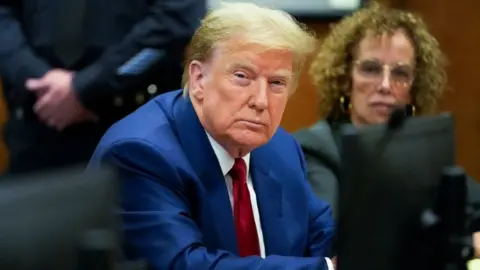Jury questionnaire in Donald Trump hush money trial released
 Getty Images
Getty ImagesThe questions that will be asked of the jury in Donald Trump's upcoming hush money criminal case have been revealed.
They range from whether prospective jurors listen to podcasts to their feelings about a former president being criminally tried in state court.
Also on Monday, an appeals court dismissed Mr Trump's most recent effort to delay the case.
He had sued the Manhattan judge overseeing the trial earlier in the day.
A New York court order published on Monday afternoon contained the questions for potential jurors. Jury selection for the trial is set to begin next week, on 15 April.
They ask the jury pool to reveal information about themselves, particularly whether they have participated in any groups that either oppose or support Mr Trump.
The questions are most specific about the following groups: the QAnon movement, the Proud Boys, the Oathkeepers, the Three Percenters, the Boogaloo Boys and Antifa.
Other questions include:
- Do you have any strong opinions or firmly held beliefs about whether a former president may be criminally charged in state court?
- Do you have any feelings or opinions about how Mr Trump is being treated in this case?
They will also be asked about what media they watch and read and the social media they follow.
The former president was charged last year with a felony over a hush money payment made to adult film actress Stormy Daniels, with whom he is accused of having an affair.
He has pleaded not guilty to falsifying business records, and he has continued to claim that this case and his other legal issues are the result of political persecution.
Mr Trump - the Republican presidential candidate for 2024 - has complained about the setting of his trial in Manhattan, a borough with a large number of Democratic voters.
He alleges that he will not face an unbiased jury on the island that long served as his home.
Experts have told the BBC that jury selection for the trial, could pose a challenge for Mr Trump's legal team.
"It's doable, but it's going to be difficult," former Brooklyn prosecutor Julie Rendelman said.
Mr Trump's hush money trial is one of four criminal cases he is facing, but it may be the only trial to take place before the upcoming presidential election in November.
In an apparent effort to delay the upcoming trial, Mr Trump filed a lawsuit on Monday against New York Justice Juan Merchan. An appeals court judge dismissed that last-minute attempt just hours later.
Mr Trump was seeking to change the location of the trial and dismiss a gag order that limits his ability to comment on the case, according to BBC's US partner CBS News.
The lawsuit was not made public and BBC has not been able to review it. Two legal filings with the titles "change of venue" and "stay" were visible in an online court database, however, according to CBS.
The BBC has contacted Mr Trump's legal team for comment.
Mr Trump's trial was already delayed from the end of March to 15 April due to the unexpected release of a batch of documents from federal prosecutors that lawyers in the case needed time to review. The former president's legal team had sought to push back the trial to an even later date.
He has also complained about a gag order imposed on him by Justice Merchan, who is overseeing the trial.
Mr Merchan initially imposed a gag order preventing Mr Trump from commenting publicly about witnesses, jurors and others connected to the case.
But Manhattan District Attorney Alvin Bragg asked to expand the order to cover the families of those involved in the case after Mr Trump attacked the judge's daughter on social media.
"This pattern of attacking family members of presiding jurists and attorneys assigned to his cases serves no legitimate purpose," Mr Merchan wrote in a ruling on the gag order.
In a separate development, justice department special counsel Jack Smith wrote to the Supreme Court on Monday in a legal filing to ask that it reject Mr Trump's claim of absolute presidential immunity.
The Supreme Court will hear oral arguments in Mr Trump's immunity case on 25 April.
Mr Smith wrote that siding with Mr Trump in the matter "would free the President from virtually all criminal law—even crimes such as bribery, murder, treason, and sedition".
The special counsel is prosecuting the former president in a classified files case and in a 2020 elections interference case.
